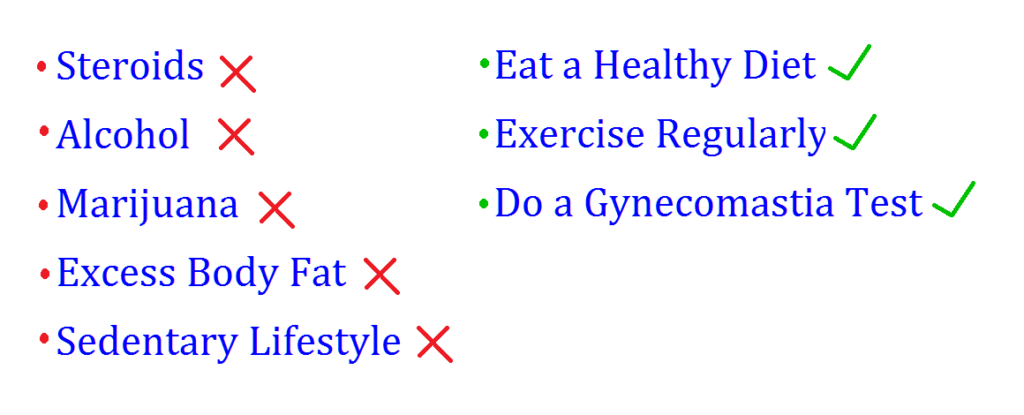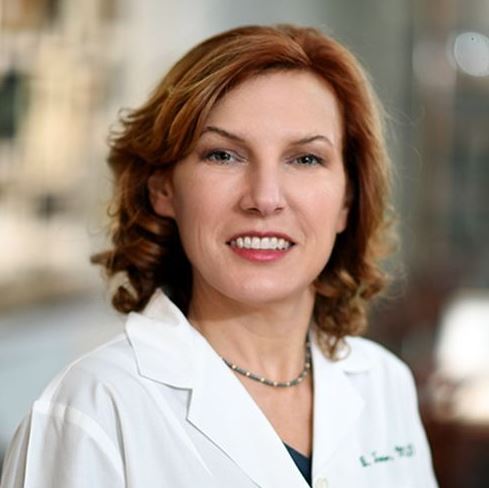Gynecomastia is not a life-threatening condition, but it can lead to psychological distress, lower self-esteem, and affect one’s quality of life. The good news is that prevention of gynecomastia is possible, and in this article, you will discover how to do it.
Gynecomastia, commonly known as “man boobs,” is a condition that causes the breast tissue in males to swell and become larger than normal.
The condition affects men of all ages and can have various causes, including hormonal imbalances, certain medications, and underlying health conditions.
Prevention of Gynecomastia in 5 Steps
- Live a healthy lifestyle
- Be aware of medications that can cause gynecomastia
- Treat any underlying condition that can cause gynecomastia
- Read about gynecomastia
- Do gynecomastia pinch tests at home
A Healthy Lifestyle Can Prevent Gynecomastia

Maintaining a healthy lifestyle is one of the most effective ways to prevent gynecomastia. Here are some tips to follow:
Exercise regularly
Regular exercise can help reduce body fat and increase muscle mass. This can help prevent gynecomastia caused by obesity and hormonal imbalances.
Maintain a healthy weight
Being overweight or obese can increase the risk of gynecomastia. Maintaining a healthy weight can help prevent this condition.
Avoid alcohol and drugs
Alcohol and drugs can disrupt the hormonal balance in the body and cause gynecomastia. It is best to avoid or limit their use.
Eat a healthy diet
A healthy diet rich in fruits, vegetables, lean proteins, and whole grains can help maintain hormonal balance and prevent gynecomastia.
Awareness of Medication that can cause gynecomastia
Certain medications can cause gynecomastia. It is important to be aware of the medications that can cause this condition and discuss alternative options with your doctor. Here are some common medications that can cause gynecomastia:
Anti-androgens
These medications block the action of male hormones and can cause breast enlargement in men.
Anabolic steroids
These are synthetic hormones that can increase muscle mass, but they can also cause breast enlargement in men.
Some medications for ulcers and heartburn
These medications can increase the production of prolactin, a hormone that can cause breast enlargement in men.
Some chemotherapy medications
Chemotherapy can disrupt the hormonal balance in the body and cause gynecomastia.
Treatment of Underlying Health Conditions
Gynecomastia can be a symptom of an underlying health condition. Treating the underlying condition can help prevent or treat gynecomastia. Here are some health conditions that can cause gynecomastia:
Hormonal imbalances
Hormonal imbalances, such as low testosterone or high estrogen levels, can cause gynecomastia. Treating these imbalances can help prevent gynecomastia.
Hypogonadism
Hypogonadism is a condition where the testicles do not produce enough testosterone. This condition can cause gynecomastia, and treating it can help prevent or treat gynecomastia.
Liver disease
Liver disease can disrupt the hormonal balance in the body and cause gynecomastia. Treating the liver disease can help prevent or treat gynecomastia.
Tumors
Certain tumors, such as those that produce hormones, can cause gynecomastia. Treating the tumor can help prevent or treat gynecomastia.
Prevent moobs in men
Prevention of gynecomastia starts with living a healthy lifestyle, being aware of the common factors that cause this condition. That makes it easy to detect underlying health conditions that can cause gynecomastia, and treat them.
If you are experiencing breast enlargement or other symptoms of gynecomastia, you can start with a gynecomastia pinch test to determine if you have it. If the tissue under the nipple is feels hard like an egg or is lumpy, then that is gynecomastia.
You can start with natural gynecomastia treatment, or consult a doctor for the best medical treatment.
